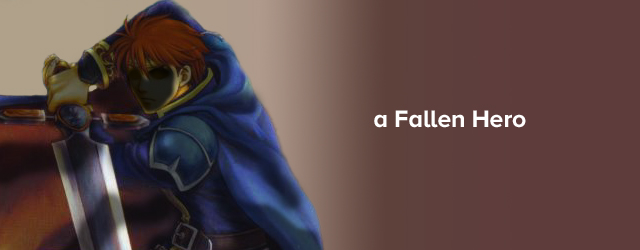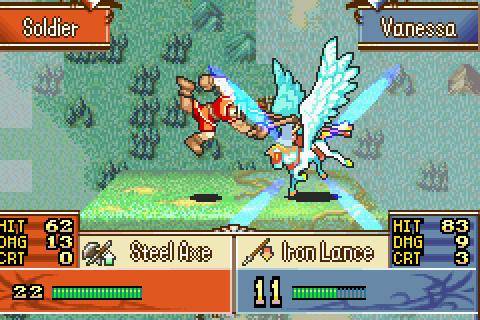
Death is an inevitability, both in the worlds of video games and reality, but what should be the ultimate end to life is often trivialized in the medium we so enjoy by its frequency and relative inconsequence. Since the advent of games, designers have been faced with the metaphysical struggle of representing death in virtual form, and while this search has yielded many unique and innovative results, the fact remains that any consequence of dying is immediately revoked once the player is given a second chance. Death, then, becomes little more than a mere annoyance, and while some games are content with this approach, others have taken greater measures to employ death in a more realistic and meaningful fashion.
The Fire Emblem series was among the first to instill a sense of finality to its virtual deaths, a forward-thinking and unorthodox concept for a franchise birthed on NES. Where dying once meant losing only your progress, a dreadful consequence in itself considering many games at the time still did not feature a means of saving your play data, doing so in Fire Emblem effectively removed the deceased permanently from the rest of the adventure. There were, admittedly, some exceptions to this (characters integral to the narrative, for example, would still appear during the game’s expository sequences) but by and large a hero’s death genuinely did feel like a permanent loss.
But why is this? In an field of typically light entertainment that so actively encourages the slaying of adversaries, why do these particular deaths weigh so heavily on our emotions? There is, of course, no clear-cut answer, and our attachment to these characters can stem from a variety of different reasons: their utility, their design, our own completist tendencies. All of these are plausible explanations, but perhaps the most important– and the one which each installment takes the greatest pains to establish– is their personalities. Among the series’ most unique attributes is the fact that each unit you command has his or her own individual personality. Unlike its brethren series, Advance Wars, Fire Emblem places a cast of real and varied characters at your behest, with their own unique motives for joining your struggle. This is a far cry from the nameless infantry units you command in other strategy games and adds an interesting layer of personalization to the experience. That these characters are developed primarily through candid conversations with other party members before (or even in the midst of) battle only strengthens this sense of camaraderie, and it really feels as though you get to know each of your soldiers on a personal level.

Fire Emblem for Game Boy Advance was a unique experience for me in part because it was my first real foray into turn-based strategy games. Like many others, I had not even heard of the series until Marth and Roy appeared in Super Smash Bros. Melee, and all of the franchise’s history and idiosyncrasies were lost on me until I called upon the omniscient powers of the internet to learn more about it. Among my first discoveries was the way in which the series handles the death of characters and I became immediately intrigued by the realism of this approach. Coupled with the vast and varied cast each entry featured, the series seemed to place an unheard of (at least to me at the time) emphasis on plot and character development, making it unlike any game I had yet experienced.
While it is one thing to read about it, actually witnessing a character’s death in the middle of a battle will evoke a range of different emotions, most prominent among them being loss and frustration. The latter is certainly understandable– after having meticulously battled through a lengthy chapter, losing a hero (especially one that is particularly useful) effectively means having to redo the entire mission. The former, however, is quite strange, especially given that the majority of your party is comprised of characters entirely inconsequential to the actual plot. So why do we feel this sense of loss? Aside from our own attachment to each of its characters, the game plays its own sly part in tugging at your heartstrings: its soundtrack shifts to a sad melody the moment the deathblow is struck, and the deceased bids one final heartrending farewell before passing on to that great Game Over screen in the sky. Our reactions to this, of course, will depend upon the character in question, but more often than not the event is enough to make us restart the entire chapter despite how much progress we may have made up until that unfortunate point.
Whatever the reason, the Fire Emblem series has been consistently able to instill a real sense of emotional weight to its characters’ deaths. That they are (almost) irreversible is certainly part of the reason for this, but just as important is the care with which the series develops its many characters. Were it not for these likeable heroes, death would not pose nearly as large of a threat to the player, and its impact would not be nearly as emotional.




 ShareThis
ShareThis







I’ve had to get used to the fact that, when I lose a soldier in FE, I shouldn’t just restart the chapter to get them back. That method of cheating the system is not what the developers had in mind.
I actually think if that were the case there wouldn’t even be an option to restart (or you would at least be penalized for restarting, kind of like in Animal Crossing). Either way I’d still do it. :p
Haha, I do feel like developers expect us to restart though. I, uh, have spent too many hours doing that.
I mean, it’s still emotionally weighty to me! … in the sense that I get angry and frustrated, hahah.
I was never able to play FE straight-up. I had to restart. My reasons were ruthlessly practical; more often than not, it seemed the fallen ones were either unique or indespensible to my strategy.
Whatever philosophical issues the developers intended with the mechanic — and I do not doubt that they did — I found it to be endlessly irritating, and as a result I never have really gotten into the series as others have.